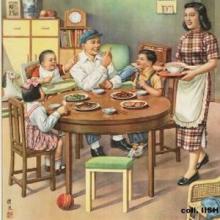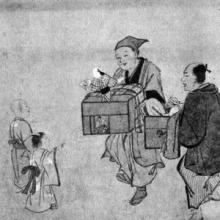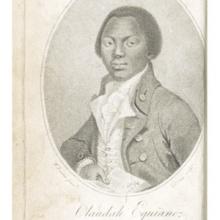Social Structure

Short Teaching Module: Chinese Propaganda Posters
Visual images provide valuable material for the exploration of childhood, youth and history.

Short Teaching Module: Play in Tokugawa Japan
At the beginning of a lecture on the daily life of townsmen in Edo (Tokyo), I first presented an image of Tokugawa-period (1600–1868) Japanese children. This detail from an ink painting by Hanabusa Itchô (1562–1724) shows a childhood experience common to both sexes: watching a puppet show.

Short Teaching Module: Childhood and Transatlantic Slavery
Especially useful in helping to place slavery in a world history perspective is one of the first slave narratives, The Interesting Narrative of the Life of Olaudah Equiano or Gustavus Vassa the African, originally published in 1772.
Soviet Dissidents and the "Brain Drain"
In the beginning of 1989, Henry Kissinger met with Mikhail Gorbachev for an informal conversation about the future of U.S.-Soviet cooperation, particularly concerning economic opportunities in the Soviet Union. The problem for U.S.-Soviet trade was the Jackson-Vanik Amendment to the 1974 U.S.
President-Elect Bush Informs Mikhail Gorbachev of His Need for Time to Formulate New Policies
Soviet-American relations thawed during the second term of President Ronald Reagan as he and Soviet leader Mikhail Gorbachev developed a personal rapport, signed the first treaty between the superpowers to reduce nuclear weapons arsenals, the Intermediate-range Nuclear Forces (INF) Treaty, and mo
Plans for Reorganizing Solidarity
Prior to the historic roundtable talks that took place between February and April 1989 in Poland, preparations took place on many levels.
Mikhail Gorbachev Reports on the Trilateral Commission
During the significant changes that were brewing in the Soviet Union and Eastern Europe in the 1980s, Mikhail Gorbachev (leader of the Soviet Union) met with members of the Trilateral Commission, a nongovernmental organization founded in 1973 by private citizens of Japan, North America, and Europ
The Soviet withdrawal from Afghanistan
On 25 December 1979, the Soviet Union deployed its army in Afghanistan, in support of the Afghan Communist government against a group of Muslim opponents.
Hungary announces 1956 is a "People's Uprising"
On 23 June 1988, the Hungarian Socialist Workers' Party (Communist) Central Committee established a committee to analyze Hungary's political, economic and social development during the preceding thirty years. The issue of the 1956 Soviet invasion of Hungary became a political flashpoint.
Changes in Eastern Europe and Their Impact on the USSR
This February 1989 report by the Bogomolov Commission analyzes the current situation in Eastern Europe for Alexander Yakovlev, key foreign policy advisor to Mikhail Gorbachev. The Bogomolov Commission was the largest Soviet think tank conducting research on the East European countries.